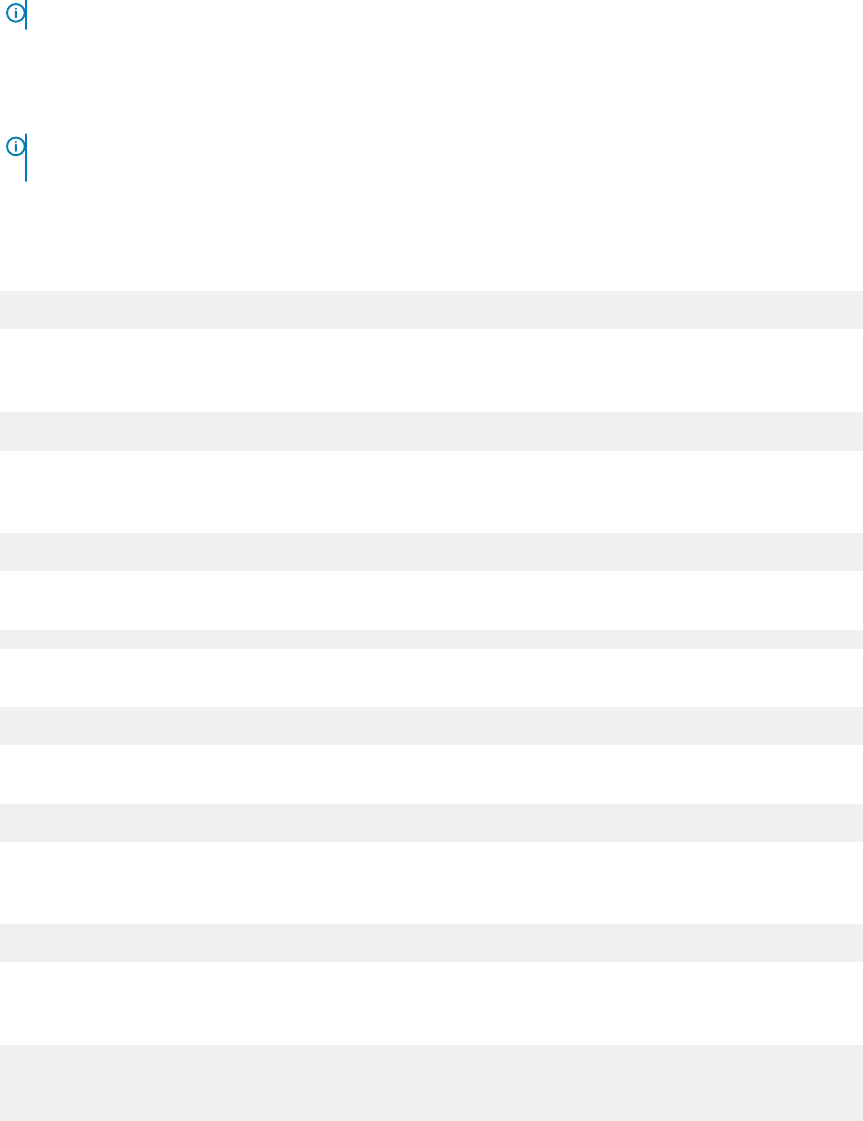Concept Guide
Table Of Contents
- Dell EMC Networking Open Automation Guide 9.14.1.0 November 2018
- About this Guide
- Open Automation Framework
- Bare Metal Provisioning
- Introduction
- How it Works
- Prerequisites
- Industry Standard Upgrades with BMP
- BMP Process Overview
- BMP Operations
- Configure BMP
- BMP Commands and Examples
- System Boot and Set-up Behavior in BMP Mode
- BMP Mode - Boot and Set-up Behavior
- DHCP Offer Vendor-Specific Option for BMP
- DHCP Offer Relay Option 82
- Software Upgrade Using BMP
- Apply Configurations Using BMP Scripts
- Using the Post-configuration Script
- Using Auto-Execution Script - Normal Mode Only
- Timers in Pre–configuration and Post–configuration Scripts
- Script Examples
- BMP Operations on Servers Overview
- File Server Settings
- Domain Name Server Settings
- BMP MIB Support
- Bare Metal Provisioning CLI
- Open Management Infrastructure
- Puppet
- Smart Scripting
- Overview
- Download the Smart Scripting Package
- Dell EMC Environment Variables
- Dell EMC Proprietary Utilities
- Dell EMC SmartScript Utilities
- SQLite
- NET SNMP Client
- Limits on System Usage
- Supported UNIX Utilities
- Creating a Username and Password for Smart Scripting
- Logging in to a NetBSD UNIX Shell
- Downloading Scripts to a Switch
- Network File System (NFS)
- Setting a Search Path for Scripts
- Scheduling and Executing Scripts
- Running a Script from the UNIX Shell
- Running Scripts with User Privileges
- Smart Scripting CLI
- disable
- execute
- mount nfs
- package clear-all
- package install
- package uninstall
- script (run)
- script (stop/resume/clear/kill/unschedule)
- script event-handler
- script execute (EXEC mode)
- script execute
- script get
- script path
- script remove
- script trigger-event
- show packages
- show script
- start shell
- triggered-by
- switch script limit
- username (event handler)
- username
- SNMP MIBs
- Virtual Server Networking
- Virtual Server Networking CLI
- REST API
- HTTP and HTTPS
- XML
- Important Points to Remember
- REST Authentication
- Request Query Parameters
- Sample BGP Configurations
- HTTP Status Error Codes
- REST API — Protocol Data Unit (PDU) Structure
- Configurations
- Operational
- Operational Data for IPv6
- Management Information Base (MIB)
- IETF Interface Operations
- REST API Framework to Execute the CLIs
- Samples of the config-command
- Samples of the EXEC command
- Samples of the show-command
- REST API CLI
- Web Server

Version Description
9.2(0.0) Introduced on the S4810, S4820T, Z9000, and MXL Switch.
Usage Information
The maximum number of events you can congure is 20. The maximum number of allowed tag patterns in a log
event trigger is three. The tags of the log events must be an exact comparison. The three tags work in a logical OR
operation format (match with any one of the tags occurs).
NOTE: Before deleting a trigger event, you MUST unlink the script from the event.
If you use the caret symbol (^) as a pattern, the Dell EMC Networking OS generates blank space as the starting
character of the SYSLOG. The special character $ is not allowed to use in regular expressions, as the last word in
the SYSLOG is line feed.
NOTE: The time-events schedule time takes eect once after the device congures the trigger-event
(event). A single trigger event can contain combinations of interval, weekday, month, and month day.
Related Command script event-handler — Allows you to provide mapping between the scripts and trigger events.
Examples
Following example shows how the event triggers a script, even if any one of the pattern matches.
DellEMC(conf)# script trigger-event Server_Reporter_Event log-event tag tag-or-
ex "Major alarm" "Minor alarm"
Following example shows how the event triggers a script, if the system throws the SYSLOG message like: Oct 29
05:28:16: %RPM0-P:CP %IFMGR-5-OSTATE_UP: Changed interface state to up: Ma 0/0.
DellEMC(conf)# script trigger-event Port_State_Event log-event tag tag-regex
"OSTATE.*up"
Following example shows the script triggering at 22:22 and then triggers every Monday midnight and stops at
02:02–11/10/14.
DellEMC(conf)# script trigger-event Event2 time-event start at 22:22 stop at
02:02-11/10/14 weekday mon
Following example shows the cpu-usage limit.
DellEMC(conf)# script trigger-event event1 cpu-usage 30
Following example shows how the event triggers on every month rst Sunday.
DellEMC(conf)# script trigger-event Event2 time-event weekday sun month
jan,feb,mar,apr,may,jun,jul,aug,sep,oct,nov,dec mothday 1-7
Following example shows how the event triggers at the end of every quarter.
DellEMC(conf)# script trigger-event Event2 time-event mon jan,may,sep weekday
sun monthday 24-31
Following example shows how the event triggers a script, when all the (tag–and–ex) combinations matches with
the system SYSLOG message:
DellEMC(conf)# script trigger-event event7 log-event tag tag-and-ex ASTATE
Admin up
Following are the various combinations of examples to trigger a script, when the regular expression matches with
the system SYSLOG message:
DellEMC(conf)# script trigger-event event1 log-event tag tag-regex ASTATE.*up
DellEMC(conf)# script trigger-event event6 log-event tag tag-regex "^ [A-Za-z]
+.* Syslog [0-5]"
Smart Scripting CLI
107










